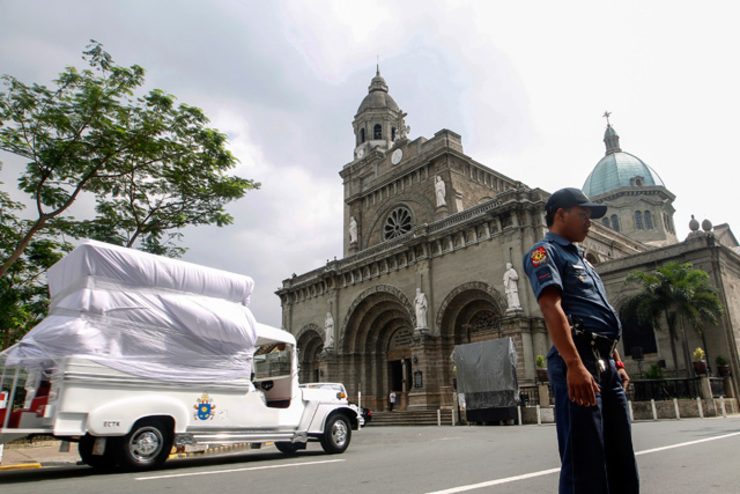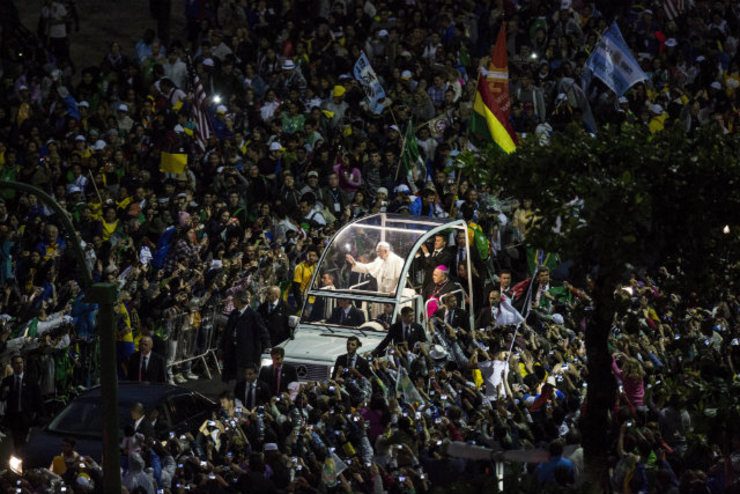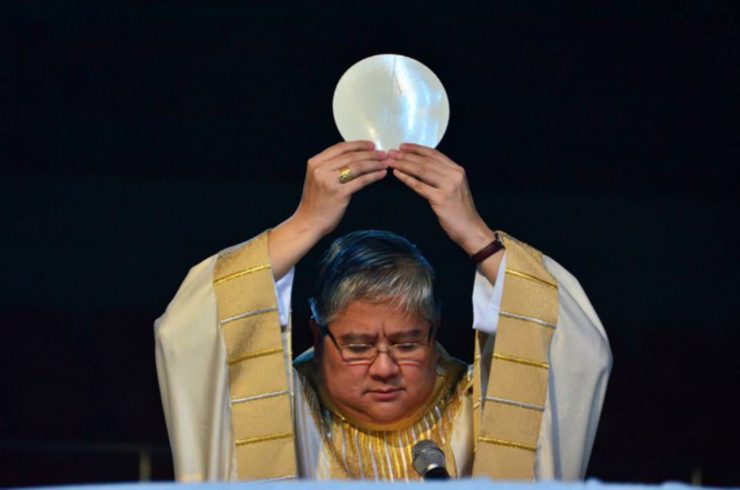SUMMARY
This is AI generated summarization, which may have errors. For context, always refer to the full article.

MANILA, Philippines – The centuries-old Manila Cathedral is set to welcome the third pope to grace its hallowed halls this week, when Pope Francis celebrates his first Philippine Mass with 2,000 priests, bishops, and religious individuals.
The two popes who came before him – Paul VI and John Paul II – both praised Filipino missionaries who dedicated their lives to build up the Catholic faithful in the Southeast Asian country.
But the two popes also made references to the challenges facing the religious community then. In his November 1970 homily, Paul VI noted the “development of towns, the increasing proportion of young people and the influence of social communications” that demand “certain pastoral and teaching methods.”
While noted for implementing the reforms of the Second Vatican Council, Paul VI is better known for reaffirming the Church’s ban on artificial contraception, a decision that enraged many Catholics then.
In his own homily in February 1981, Pope John Paul II noted the importance of apostolic activities, such as proclaiming the word of God, serving by prayer and sacrifice, and exercising charity.
But, he cautioned, the Church must be “attentive to the needs of the men and women of our time.”
“She cannot be indifferent to the problems which they face or to the injustices which they suffer,” John Paul II said.
It was a timely message: the Philippines was at the height of the Marcos years. The local Catholic Church would later play a role in the overthrow of the dictator.
Drawing from these two experiences, it’s likely that Pope Francis will also make references to the present challenges confronting the Church and modern society.
In the two years of his papacy so far, he has not been one to shy away from pointing out the shortcomings of his own institution.
Admissions and apologies
From corruption scandals to sexual abuse of children by priests, the Catholic Church has been plagued in recent years by controversies that have led to fewer pews and disillusioned followers.
Since his election, Pope Francis has tried to turn the Church’s reputation around, setting the agenda for a Church close to the people and one that could recognize its own mistakes and apologize for them.
And in his first liturgical encounter with Filipino priests this week, the Argentine pontiff will see the local clergy follow in his footsteps.
Francis’ first mass in the Philippines will feature the symbolic Confessio Peccati. In a “communal and symbolic” gesture of penitence, the clergy will confess their sins and ask forgiveness for “shortcomings and sins” related to their vows of poverty, chastity, and obedience.
An apology from the Church is not unprecedented. Faced with the problem of dwindling followers and accusations of hushed-up scandals, the Church has, in the past, made similar apologies.
In 2000, the late Pope John Paul II made history by apologizing for the Church’s sins. Francis’ predecessor, Benedict XVI, also apologized to victims of sexual abuse by priests.
In the Philippines, Manila Archbishop Luis Antonio Cardinal Tagle followed suit, apologizing for the Church’s sins against non-Catholics before an audience of 5,000 people in 2013.
Call for a responsive Church

The Pope’s vision of the Church he wanted to lead began with his choice of name.
Francis: after St Francis of Assisi, a “man of poverty and a man of peace.” When then-cardinal Jorge Mario Bergoglio told journalists the story behind the name, he also signified the beginnings of the kind of Church he wanted to lead.
In an institution reeling from scandals – from sex abuse coverups to corruption within the Curia – Pope Francis set the tone early on about the direction of his leadership. He wanted a “poor Church for the poor,” one that would “come out of herself and go to the peripheries,” to the marginalized people of the world.
In the days, weeks, and months that followed, Francis did his best to walk the talk. He shunned the luxury cars of his predecessors and preferred simpler lodgings. He hit parishes run like businesses as he continued to advocate living simply.
In December 2013, Francis set up a Vatican committee to investigate sex abuse allegations – a more concrete move to add to the apology he made to the victims.
He has also been vocal about the “ailments” of the Church, listing 15 “spiritual illnesses” during a Christmas message last year addressed to senior Church officials.
It’s acts like these that prompt some observers to brand him a progressive, liberal, or revolutionary pope. While some note that the Argentine pontiff has not exactly instituted a radical change in Church doctrine, he has changed the way the secretive institute relates to, and is perceived by, its followers.
This is because the Pope is a pastor at heart, according to Vatican reporter John Allen. In a BBC report, Allen said: “When he picks up the phone and calls a mother in southern Italy whose son is in the hospital, part of that is just genuine pastoral outreach, but part of it is also recalibrating the model of what leadership in the Catholic Church looks like.”
Will local clergy follow suit?
Has the Francis effect trickled down to the local Philippine clergy?
Not too long ago, several Catholic bishops were criticized for receiving expensive vehicles procured through charity funds.

But Francis’ example seems to have inspired some of the more recent pronouncements by the Catholic Bishops’ Conference of the Philippines (CBCP).
In a January letter to priests, CBCP President Socrates Villegas repeated the Pope’s reminder about the dangers of materialism in their vocation.
“It is a scandal for a priest to die a rich man,” he wrote.
It was an echo of a similar message Villegas made in 2014, when he denounced the “idolatry of money” and an “economy of exclusion.” (READ: Filipino bishops slam ‘economy of exclusion’)
Will the Pope make similar messages to Filipino clergy when he meets them on Friday?
In a January 10 forum hosted by the Philippine Daily Inquirer, Manila Archbishop Luis Antonio Cardinal Tagle said it would not be surprising if Francis mentioned thorny issues, like the sexual misconduct of priests, in his homily.
He added: “I won’t be surprised, because it’s something we need to be reminded of.” – Rappler.com
Add a comment
How does this make you feel?
There are no comments yet. Add your comment to start the conversation.